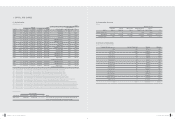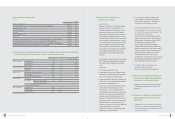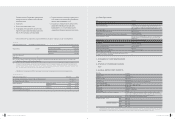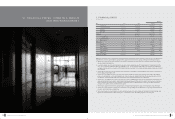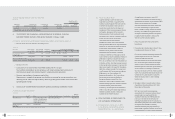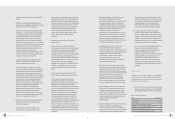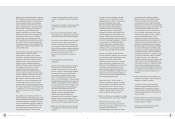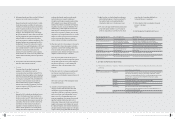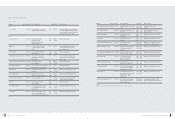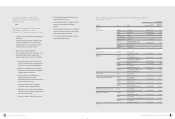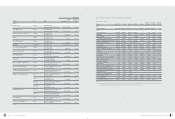HTC 2008 Annual Report Download - page 57
Download and view the complete annual report
Please find page 57 of the 2008 HTC annual report below. You can navigate through the pages in the report by either clicking on the pages listed below, or by using the keyword search tool below to find specific information within the annual report.
108 109
and solid implementation of the HTC global brand
strategy.
3. Tightly Knit Working Groups and Exceptional
Implementation Capabilities Underpin HTC Global
Logistics and Cost Control Mechanisms
In addition to strong financials and leading R&D
capabilities, our manufacturing and global logistics
- certified to the highest international standards
(including ISO-9001, ISO-14001, TL-9000 and
OHSAS 18001) - help ensure HTC maintains a
commanding position in the global smart phone
market. Continued success will rely on the support
and hard work of all HTC employees, a continuing
commitment to innovation and an insistence on
holding all procedures to high standards. At HTC,
we foster close cooperation amongst
departments, ensure the effective implementation
of plans and directives, effectively manage global
logistics and rigorously control costs.
4. Long-Term Cooperation with Telecom Service
Providers Give HTC a Direct Window onto
Consumer Needs and Preferences
HTC has developed over many years unique
cooperative relationships with many of the world's
leading telecom service providers, among which
include Europe's top five telecom operators, the
four largest telecom operators in the United States
and quite a few rising stars in the telecom service
markets of Asia. These valuable partnerships
represent direct channels for HTC products to
reach mass markets. Close working relationships
help us better appreciate user needs and
preferences, while providing exceptional
opportunities to develop products and services
tailored to meet a diverse range of telecom
operator needs. Such helps ensure HTC remains
able to hone technologies, products and services
to end user needs and expectations.
5. Market Growth Continues Unabated; Migration to
3G Expected to Increase Demand for Data
Transmission Speeds
Product models are regularly updated and
improved, while the rapid evolution of critical
components and supporting software are quickly
expanding the role and value of mobile phones in
our daily lives. Market research forecasts that the
product market served by HTC will continue to see
growth over the coming several years. Ongoing
investment and promotion of the 3G network by
telecom operators are also expected to spur
consumers to upgrade to 3G enabled mobile
phones. These external market factors should
benefit HTC business growth and future
expansion.
6. Comprehensiveness of Domestic Industry
Infrastructures
Taiwan now enjoys a relatively strong and
comprehensive domestic network able to act upon
and supply HTC input needs. Most critical HTC
components, including printed circuit boards,
resistors, capacitors, chipsets, and power supplies
and modules are now domestically sourced.
Supported by a large technically skilled workforce,
Taiwan suppliers continue to be able to leverage
their production automation advantages,
streamlined cost structures, flexibility and strong
management capabilities to win business and
remain a viable link in the international supply
chain.
• Factors Adverse to the Achievement of HTC
Growth Goals, and Relevant Countermeasures
Trends toward smart phone products are
encouraging new entrants into the market,
attracted by the sector's continued strong growth
prospects. As the curtain rises on the post-
information age, large corporations such as Apple
can also be expected to become involved in smart
phone product development and production
activities. Under such a scenario, we anticipate
that mobile telecommunication devices will be
increasingly designed to serve an expanding
menu of applications, incorporate increasingly
diverse functions, anticipate shorter life cycles and
enter an increasingly competitive market. In
addition, difficult economic factors worldwide are
placing negative pressures on demand growth for
mobile phones. In light of these several adverse
factors, HTC has put into effect countermeasures
as follows:
1. Redoubled Emphasis on R&D and Innovation.
HTC will work to maximize the practical
advantages of R&D efforts and to shorten product
development cycles in order to maintain and
strengthen its leading edge in the smart phone
sector. HTC will enhance product differentiation to
support profit margins, avoid price-based
competition, and earn stronger sales
performances. The successful launches of HTC
Touch and Touch Diamond signal the importance
of the mass market in mobile phone design work.
As such, innovation and R&D efforts are also
being channeled toward making devices that are
increasingly user friendly and functional.
2. HTC will continue to enhance and improve
product designs, production, logistics &
distribution support, and after sales service for its
current customers with an eye toward striking new
strategic partnerships with major global
manufacturers and brand owners. We are
committed to keeping on top of global
developments to secure a stronger platform for
continued growth and success.
3. HTC will plan and put in place efficient global
materials supply and logistics support systems as
one critical component in the company's global
logistics model. Volume buying will be leveraged
to lower input costs, while a materials requirement
planning (MRP) system will be engaged to
manage material inventories and anticipate
replacement needs. Such measures will help
lower inventory management costs and reduce
inventory devaluation and obsolescence losses.
4. The productivity of each link in HTC's business
chain must be maximized, with enhanced time
management, standardized workflows, and the
comprehensive implementation of ISO quality
control policies. Benefits will include lower process
and communication costs and comprehensive
quality management to raise HTC
competitiveness.
5. At present, critical components for HTC products
are still purchased from suppliers located
overseas. However, even so, HTC's leadership
position and strong technical grounding mean that
all suppliers have been exceptionally willing to
accommodate and meet HTC priorities in order to
maintain and expand their own market sales. As
we manage our relationships with all suppliers as
important strategic alliances, we are able to
secure their further support, which has helped
further lower our costs of materials purchases.
6. In terms of our current reliance on multiple
channels for input supplies, HTC continues to
identify and build supplier relationships that cover
multiple material input needs and enhance supply
stability. Our objective remains a consistent and
uninterrupted supply of all material inputs obtained
within a highly competitive cost structure.
7. As the most vibrant and fastest growing sector of
Taiwan's economy, the electronics industry
requires a steady stream of human resources.
Layoffs and downsizing in the general
manufacturing sector have increased the difficulty
in finding and hiring entry-level workers. Thus,
HTC plans to continue bringing entry-level
workers from overseas to work in its domestic
operations while working closely with academic
organizations to help increase domestic hirings in
the future.
(2)Risk Issues
An analysis of positive and negative factors affecting the
markets and sectors in which HTC operates offers the
following assessment of risks faced by the corporation
and related response measures.
1. The effects of interest rate changes, exchange rate
fluctuations and price inflation on HTC profitability,
and anticipated response measures to be taken:
Affect on HTC profitability:
Item 2008 (NT$1,000 or % )
Net Interest Income 1,368,090
Net Forex Income 146,682
Net Interest Income as percentage of net revenue 0.9%
Net Interest Income as percentage of Earnings Before Tax 4.3%
Net Forex Income as percentage of net revenue 0.1%
Net Forex Income as percentage of Earnings Before Tax 0.5%
2OO 8 HTC AN N UAL REPO RT
VI. FIN AN CIAL STATUS, O PERATIN G RESULTS AN D RISK MAN AGEM EN T
'0 8A R_ HT C/ 英文版* NEW 05/ 21/ 20 09 11: 02 頁面 10 8




